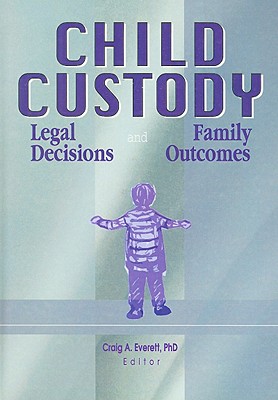Child Custody is an incisive, up-to-date collection of studies that addresses both child custody decisions and the varied and often surprising outcomes for those children and their families. Divided into two main sections, one focusing on legislative guidelines and the other on family issues, this unique compilation of recent divorce and remarriage research gives you a rare sneak peek at the attitudes some judges have toward divorce.
For too long, divorce and remarriage literature has focused only on the outcome in the personal lives of the divorcees during and after divorce. But now, in Child Custody: Legal Decisions and Family Outcomes, you’ll see that divorce is a chain reaction that begins in the courtrooms and branches out into the families of the world, changing the lives of children, parents, and grandparents alike.Child Custody is an incisive, up-to-date collection of studies that addresses both child custody decisions and the varied and often surprising outcomes for those children and their families. Divided into two main sections, one focusing on legislative guidelines and the other on family issues, this unique compilation of recent divorce and remarriage research gives you a rare view of the attitudes some judges have toward divorce. In addition, those people in both law and family research fields will have at their disposal the many aspects of the legal decision-making process and the legislative guidelines that currently hold sway over custody and post-divorce cases. Here are some of the topics you’ll read about:
- the evolution of three types of residential custody arrangements--father, mother, and joint--followed over a two-year period
- legal reforms aimed at guaranteeing parental access to children
- how social research has shaped New Hampshire’s child support policy
- divorced fathers and mothers in Greece
- the stigmas on lesbian mothers in custody cases
- how grandparent involvement shapes post-divorce familiesMeant as a catalyst for further research and study, this book begins to touch upon the intrinsic flaws in both legal and family systems that continue to exist. Too often, we think of divorce and child custody as merely legal decisions. In Child Custody, however, you’ll find that what matters in court is also a family matter.
Get Child Custody by at the best price and quality guranteed only at Werezi Africa largest book ecommerce store. The book was published by Taylor & Francis Inc and it has pages. Enjoy Shopping Best Offers & Deals on books Online from Werezi - Receive at your doorstep - Fast Delivery - Secure mode of Payment
 Jacket, Women
Jacket, Women
 Woolend Jacket
Woolend Jacket
 Western denim
Western denim
 Mini Dresss
Mini Dresss
 Jacket, Women
Jacket, Women
 Woolend Jacket
Woolend Jacket
 Western denim
Western denim
 Mini Dresss
Mini Dresss
 Jacket, Women
Jacket, Women
 Woolend Jacket
Woolend Jacket
 Western denim
Western denim
 Mini Dresss
Mini Dresss
 Jacket, Women
Jacket, Women
 Woolend Jacket
Woolend Jacket
 Western denim
Western denim
 Mini Dresss
Mini Dresss
 Jacket, Women
Jacket, Women
 Woolend Jacket
Woolend Jacket
 Western denim
Western denim
 Mini Dresss
Mini Dresss






























































